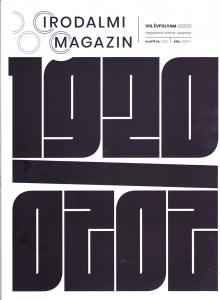
Literary Journal 2020/2. 1920/2020
Literary Journal 2020/2. 1920/2020
Editor-in-Chief: Péter János Kondor
NSZL– PLM – Magyar Napló Publishers Ltd., Budapest, 2020., 120 pages
ISSN 2063-8019
The word Trianon hardly denotes merely a significant historical event, but rather a living process of a hundred years of a defining trauma, and its innumerable untold stories.
How has this line event affected and continues to affect Hungarian literature to this day? How has the literary life, institutional system, and view of literature in the motherland and the breakaway areas changed, and last but not least: how does Trianon appear in literary texts? This year’s second issue of Literary Magazine seeks to review the past hundred years in these respects.
The editors talk about the issues of regionalism and transnationalism with the literary scholar Ferenc Vincze, the literary representation of Trianon with the literary historian Júlia Vallasek, the literary historian Béla Márkus In connection with his novel, he was asked about the literary and historical processing of the peace dictatorship and the significance of personal involvement.
In addition to concise descriptions of Hungarian literature in cross-border areas, we can read analytical writings on László Németh's Trianon experience, Gyula Illyés's connection with Hungarians abroad, and the representation of peace in education and the oeuvre of four Transylvanian novelists.
Literary Journal, a quarterly joint publication of Magyar Napló and National Széchényi Library is a richly illustrated magazine of more than 100 pages, primarily dedicated to the broad audience, but also well usable as educational material. Its thematic issues always focus on one classical author, period of literary history or cultural phenomenon. Apart from including texts so far unpublished, Literary Journal can also significantly broaden the horizon of re-reading. The previous issues were dedicated to Gyula Illyés, Sándor Márai, Géza Gárdonyi, Gyula Krúdy and Miklós Zrínyi.
Shopping
Our publications are available in our bookshop, or can be ordered from the Publications Department of the NSZL using the contact details below: Főigazgatói Kabinet kiadványtára, Országos Széchényi Könyvtár, 1276 Budapest P.O. box 1205., phone: 06-1-23-23-506, e-mail: kiadvanytar@oszk.hu.




